Let Floridians Decide
Restoring Abortion Access: Florida’s 2024 Amendment 4 Explained
Amendment 4 Explained
What Exactly is Amendment 4?
Amendment 4 is a crucial ballot measure that protects the right to abortion in Florida. It would add to the state constitution that Florida politicians–no matter their political party–cannot interfere in our private medical decisions.
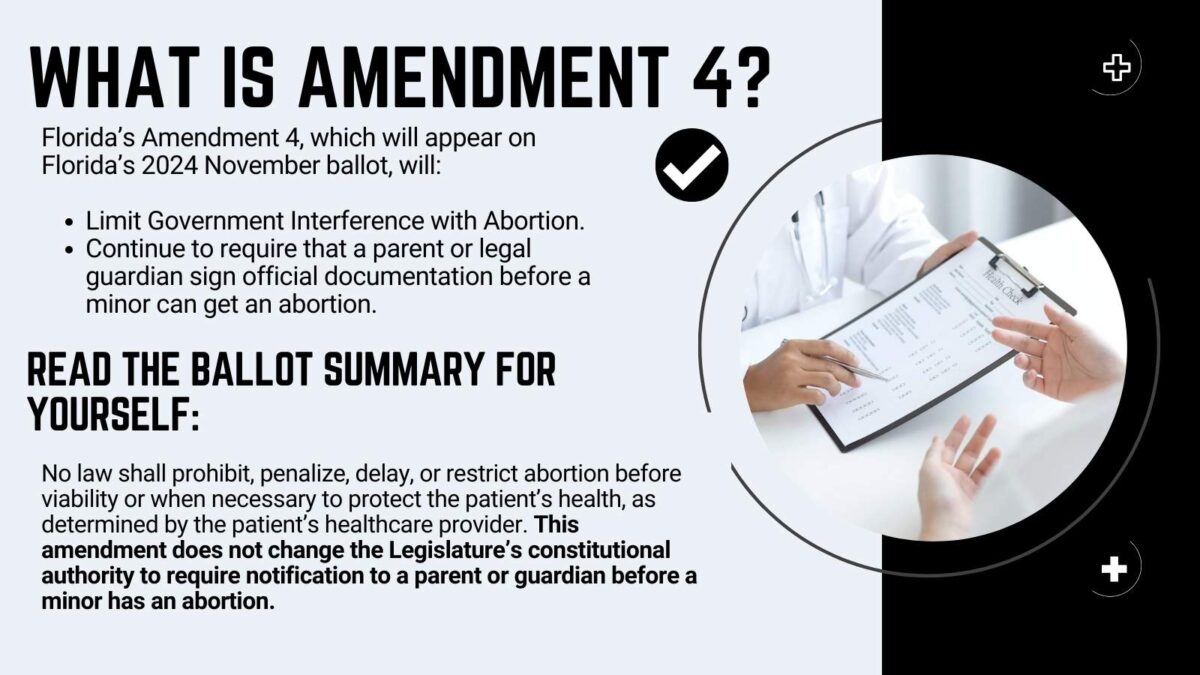
Why is Amendment 4 Critical for Floridians?
Currently, most abortions are illegal in Florida after six weeks, which is before many women even realize they are pregnant. Passing Amendment 4 will ensure that no politician can make your personal medical decisions. This amendment will give Floridians the power to decide what’s best for our families, health, and future without government overreach.
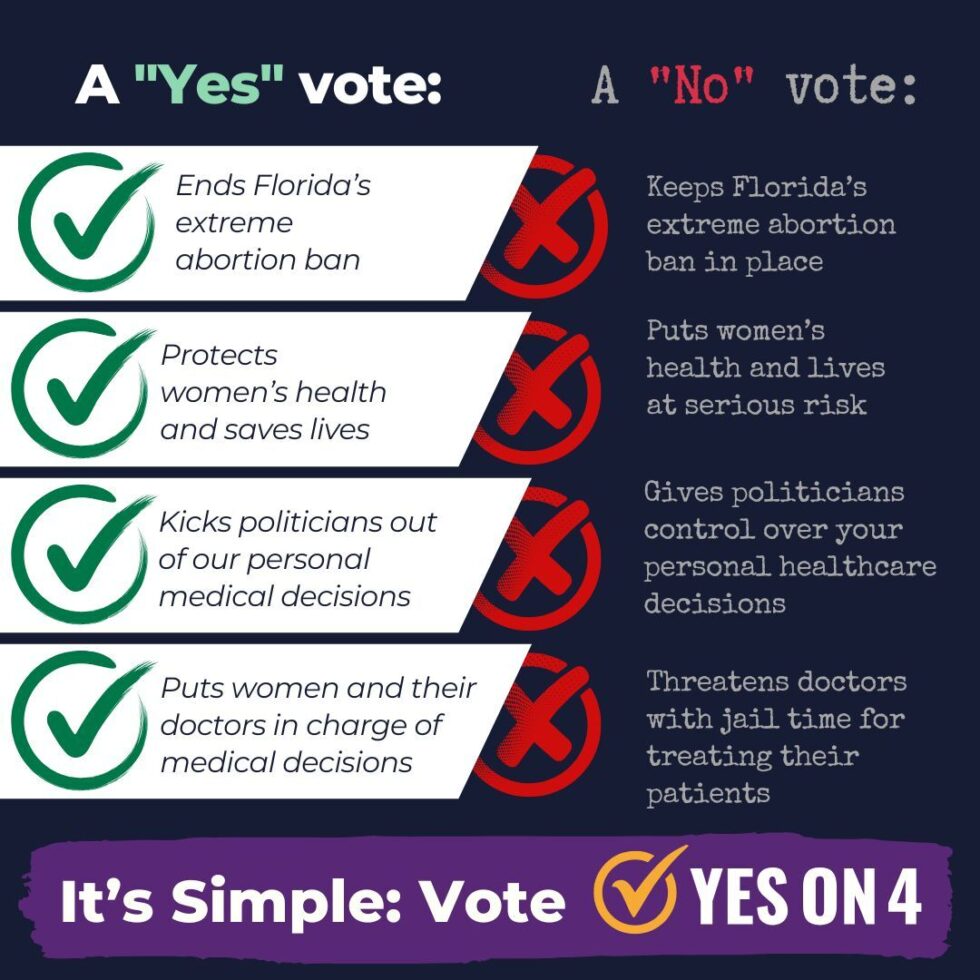
Is Amendment 4 Too Extreme or Radical for Floridians?
No. It is Florida’s abortion ban that is too extreme for Floridians. Banning abortions at six weeks is not only radical, it is dangerous.
Many women don’t even realize they’re pregnant at 6 weeks. Because pregnancy is dated from your last menstrual period, this ban actually prohibits you from getting an abortion only four weeks after fertilization occurs. Given all the steps necessary between the time you recognize a pregnancy and when you are actually able to obtain care, the window for getting an abortion in states with a six-week ban is extremely narrow.
Why Six-Week Bans Make it Impossible for Many Women to Get Care?
Since October 2024, four states–Florida, Georgia, Iowa, and South Carolina–have enacted laws that ban abortion at six weeks. According to the Guttmacher Institute, an independent research firm that focuses on reproductive health:
“Except for Florida’s statute, these laws do not expressly state that abortion is banned at six weeks. They instead require abortion providers to check for embryonic or fetal cardiac activity–what the laws erroneously refer to as a fetal heartbeat. Use of the term heartbeat is medically inaccurate: There is no heartbeat at this stage of an embryo’s development, but at around six weeks’ gestation, ultrasounds may detect electric impulses from cardiac cells.”
This misleading terminology in these so-called “heartbeat laws” that anti-abortion politicians are using to ban reproductive health care represents a concerted effort to confuse women and healthcare providers while gaining public support for increasingly restrictive abortion limits.
Equally troubling, the Guttmacher Institute found that even if you recognize you are pregnant before six weeks, it does not guarantee you will be able to get a legal abortion.
According to the Guttmacher Institute, less than a quarter (24%) of women who knew that they were pregnant before six weeks were also able to get an abortion before six weeks.
That’s because most of the states with abortion bans also have other baseless restrictions, like mandatory waiting periods of 24 hours to 72 hours, which means women have to visit a clinic multiple times to get a safe and simple procedure that has been obstructed by relentless politicized attacks.
Vote Yes
Why should I vote Yes on Amendment 4?
Since May 1, 2024, abortion has been illegal in Florida after six weeks of pregnancy with very few exceptions that require official documentation.
Passing Amendment 4 would give adult Floridians the right to make an important medical decision on their own by adding the following language to the state’s constitution:
“Except as provided in Article X, Section 22, no law shall prohibit, penalize, delay, or restrict abortion before viability or when necessary to protect the patient’s health, as determined by the patient’s healthcare provider.”
Parental Rights
The ballot measure would keep in place state law that requires medical providers to notify a parent or legal guardian when a minor under their care seeks an abortion, which is outlined in Article X, Section 22 of the Florida Constitution.
Read the ballot measure language for yourself on the Florida Division of Elections website, or check out Wikipedia’s short explainer:
“Florida Amendment 4 is a proposed amendment to the Florida Constitution that will be subject to a referendum on November 5, 2024. The amendment would establish a constitutional right to abortion before fetal viability (generally considered to be between 23 and 24 weeks gestational age).”
Pledge to Vote:
I pledge to vote.
Amendment 4 Certification Process
Did you know that Amendment 4 is one of just two citizen-led initiatives on Florida’s ballot this November? Citizen-led initiatives represent the most direct way for the government to enact the will of the people.
In Florida, there are two principal ways to put an amendment on the ballot for voters to consider. The state legislature can put constitutional amendments on the ballot through a 60% vote in both the Florida Senate and the Florida House of Representatives, or Florida citizens can collect a specific number of signatures, after meeting a host of requirements, to get their initiative on the ballot. You can read the law for yourself here, or consult Ballotpedia’s short explainer.
Florida is among the 26 states that allow citizens to initiate constitutional amendments. It’s a long, costly, and exacting process. First, sponsors of the amendment must register as a political committee with the Florida Division of Elections and submit the proposed initiative petition to the Division of Elections.
If the Division of Elections approves the petition language, a serial number will be assigned and citizens may begin collecting signatures.
Getting Measures on the Ballot
In order to qualify to appear on the ballot, the total number of signatures collected must be equal to 8% of the votes cast in the preceding presidential election in Florida.
To qualify an initiative for the 2024 ballot, citizens were required to collect at least 891,523 valid signatures and submit them by January 2, 2024. At that point, county supervisors of elections had up to 30 days to verify signatures and submit them to the secretary of state.
In the case of Amendment 4, nearly 1 million signatures were collected, verified to have met all of Florida’s strict requirements, and accepted as legitimate by all the governing bodies, including the secretary of state.
In fact, a Florida Supreme Court ruling in April 2024 unequivocally stated that Amendment 4 must appear on the November ballot for voters to have the final word.
Citizen-Led Initiatives on the Ballot
This November, Floridians will be voting on six ballot measures, which if approved, will become amendments to the state constitution. Only two of them–Amendment 4 to limit government interference on abortion and Amendment 3 to allow adults personal use of marijuana–are citizen-led initiatives.
The rest of the amendments, which include measures to make school board elections partisan and to repeal a prior amendment that provided an equal playing field for spending on statewide campaigns, were put on the ballot by the Florida government.
If you value democracy and want the government to listen to the will of the people, vote YES on the citizen-led amendments and NO on the four amendments placed on the ballot by the government.
VOTE YES ON 4!
Can Amendment 4 pass in Florida?
What do the polls say?
Floridians overwhelmingly support a woman’s right to make her own decisions. Poll after poll has found that Floridians value reproductive freedom and don’t want politicians–from any party–meddling in their pregnancies.
According to a poll conducted by the University of North Florida’s Public Opinion Research Lab in late July 2024, nearly 70% of Florida voters surveyed said they would vote “Yes” on Amendment 4 to enshrine the right to abortion in the Florida Constitution.
Seven in 10 Florida women say abortion should be legal
An August 2024 poll conducted by KFF, an independent health policy research hub, found that about 72% of reproductive age women in Florida think abortion should be legal in all or most cases, and that’s across all political parties. It’s just common sense! Florida’s 6-week ban on abortion is too extreme for most Floridians.
The same poll reported that 60% of women of reproductive age in Florida are concerned that they or a loved one would not be able to get an abortion in an emergency to preserve their life or health, and 62% of women of reproductive age in Florida expressed concern that abortion bans and restrictions could affect the safety of a future pregnancy for themselves or a family member or close friend.
Doctors, not Politicians
Politicians are not equipped to determine what’s best for a patient’s health. Politicians do not have the comprehensive medical training required to dictate restrictions on women’s reproductive health care. Allowing politicians to weigh in on a topic they know nothing about compromises women’s safety and well-being.
I thought abortion was legal in Florida? What happened?
Florida Abortion Law
Since May 1, 2024, abortion is illegal in Florida as of six weeks, before many women even realize they are pregnant. The law banning abortion after six weeks has legal exceptions for the life of the mother, the physical health of the mother, and lethal fetal anomalies.
Legal exceptions for rape, incest, and human trafficking are included in the law; however, many women, their doctors, and even medical associations agree that these exceptions don’t work in practice.
Official documentation is required, which means if you are a survivor of rape, incest, or human trafficking, you would have to report the crime, collaborate with law enforcement, and get a set of documentation in order to get an abortion in Florida, all in a matter of weeks.
Other Abortion Restrictions
Florida has a mandatory 24-hour waiting period, which means that you would have to make two visits to a clinic, at least 24 hours apart, to get an abortion. The first visit consists of lab work, an ultrasound, state-mandated information, and a meeting with a doctor to discuss the abortion procedure. The abortion cannot occur until the second visit, regardless of the patient’s health.
Florida also has parental involvement laws, which means that if you are the parent or legal guardian of an underage girl seeking an abortion, you must be notified and sign an official, notarized document before the minor can get an abortion. If a minor’s parents are out of the picture–in jail, homeless, mentally incapacitated, deported, in another state or country–or if they are abusive, the minor can go to court and seek a judicial bypass from a judge to approve the abortion.
Taxpayer Cost
Florida law prohibits the use of taxpayer funding for abortion, including state and federal Medicaid funds, and it goes even further to bar private health plans on the Affordable Care Act (ACA) Marketplace, better known as Obamacare, from paying for abortions. These existing laws will not change.
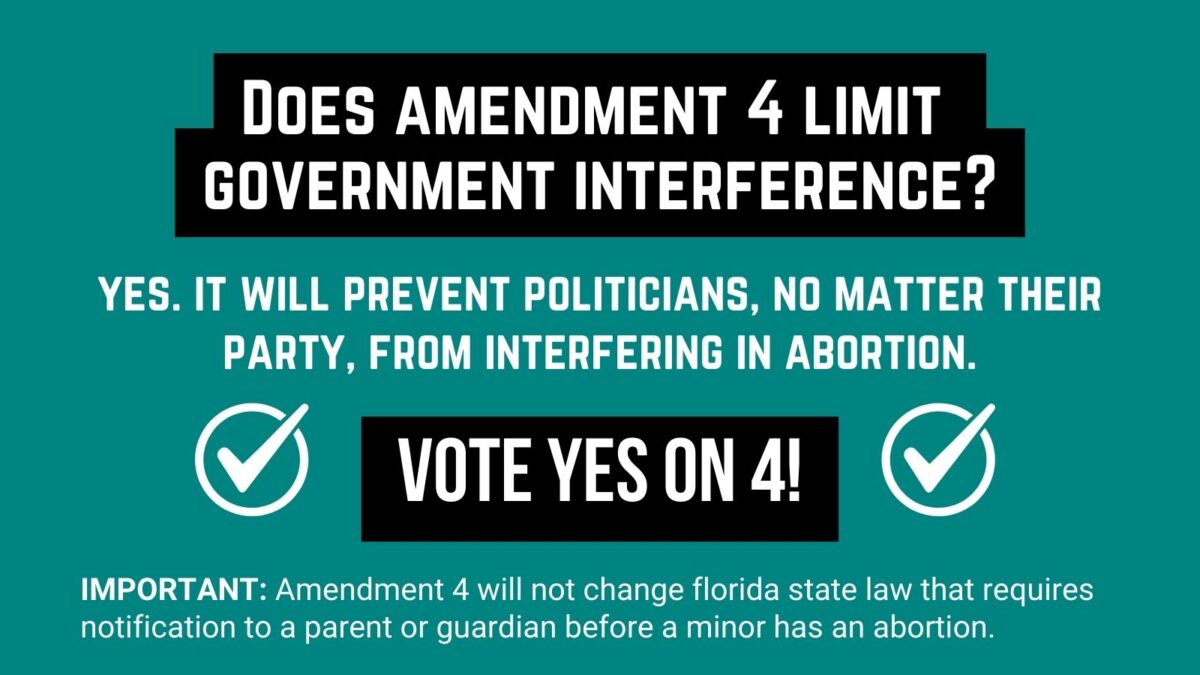
There is no legal uncertainty when it comes to taxpayer-funded abortions. If Amendment 4 is passed, the state will still be barred from using state funds, including state Medicaid funds, to cover abortion.
Parental Rights
Parental protections will also remain in place, ensuring that parents will have a say in important reproductive health care decisions made by their minor children. Most Floridians agree that a minor should not seek medical care without their parents knowing.
Likewise, all abortion clinic regulations and safety standards for women and girls will remain in place. There is nothing confusing, misleading, deceptive, or radical about Amendment 4, Florida’s 2024 Amendment to Limit Government Interference with Abortion.
It will not eliminate parental rights, as stated in the official Ballot Summary:
No law shall prohibit, penalize, delay, or restrict abortion before viability or when necessary to protect the patient’s health, as determined by the patient’s healthcare provider. This amendment does not change the Legislature’s
What is fetal viability?
Fetal viability refers to the point in pregnancy when a fetus can potentially survive outside the womb with medical support, which is generally between 23 and 24 weeks, and can vary depending on individual medical circumstances. Determining viability is a complex process, as factors and varies from case to case. Every pregnancy is unique, and healthcare providers use medical expertise and judgment to assess when a pregnancy reaches this stage.
Florida law acknowledges viability as the stage when a fetus can survive outside the womb with medical support. However, despite this medical and legal understanding, the state enacted a six-week abortion ban in 2024. This ban marks a significant departure from prior viability-based standards by limiting access to abortion far earlier in pregnancy.
Amendment 4 would end Florida’s six-week abortion ban and protect access to abortion before fetal viability, ensuring that healthcare providers—not politicians—make critical medical decisions. It would also limit interference in medical decisions during pregnancies that involve risks to the patient’s health or complex medical situations. Learn more about navigating viability.
Preventing Tragedies Like Georgia: Why Timely Care Matters
Recent events in Georgia highlight the devastating effects of restrictive abortion laws. Amber Thurman, a mother and healthcare worker, died after being denied critical care due to Georgia’s abortion ban. The fear of prosecution kept doctors from performing a routine, lifesaving procedure. We cannot let this happen in Florida. Amendment 4 ensures that Floridians receive the care they need, without interference from political restrictions.

There have been multiple documented cases in Florida where women were denied emergency abortions, putting their lives at serious risk. One such case involved Anya Cook, a woman in Broward County whose water broke at 16 weeks. She was turned away from the hospital, and by the next day, she had lost half the blood in her body. Her husband had to rush her back to the hospital to save her life. Sadly, Anya’s story is not unique–many women in Florida have faced similar life-threatening circumstances due to delayed or denied care.
In the last few weeks, ProPublica has reported the death of Candi Miller, another Georgia woman killed by the state’s abortion ban, along with the cases of two more women killed by the abortion ban in Texas.
Josseli Barnica, a young mom originally from Honduras, died after doctors in a Houston hospital delayed miscarriage care for over 40 hours because of Texas’ SB 8 law banning abortion at 6 weeks with no exceptions.
Nevaeh Crain, an 18-year-old who suffered a miscarriage on the day of her baby shower, was shuffled from hospital to hospital in Texas, vomiting, bleeding, and complaining of abdominal pain as her mother screamed at staff to do something. She, like Josseli Barnica, died of sepsis.
FAQ: How Do Florida’s Abortion Laws Compare to Texas?
With recent changes, both Texas and Florida now enforce highly restrictive abortion laws. Texas bans nearly all abortions from conception, with few exceptions, while Florida’s six-week ban includes limited, hard-to-access exceptions.
Texas’s experience shows the life-threatening impact of such restrictions. Since implementing these laws, maternal deaths in Texas rose by 61% from 2019 to 2022, far above the national increase of 8%. This increase reflects the dangers when timely care is delayed or denied.
Additionally, infant mortality in Texas increased by 12.9%, particularly among infants with congenital anomalies—a choice some families may have made under less restrictive laws. Texas also holds one of the highest maternal mortality rates in the nation, with disparities affecting Black, rural, and uninsured communities.
Florida’s six-week ban presents similar dangers. Voting “Yes” on Amendment 4 can protect healthcare access and keep critical medical decisions between patients and doctors—not dictated by restrictive laws.
Will Passing Amendment 4 legalize “post-birth abortions?”
Florida does not allow abortions after birth. The term “abortion” specifically refers to the termination of a pregnancy, which, by definition, applies only before birth. Once a baby is born, any harm to the infant would be governed by laws related to child abuse, neglect, or homicide—not abortion.
What is a “partial-birth abortion,” and does Amendment 4 allow them?
A “partial-birth” abortion is a term made up by the anti-abortion camp to scare people and politicize abortion. There is no such thing as a “partial-birth” abortion. It is not a term recognized by the American Medical Association (AMA) or The American College of Obstetricians and Gynecologists (ACOG).
In fact, in its glossary of medically accurate abortion terminology, ACOG debunks the use of the term “partial-birth abortion:”
“This graphic, inflammatory language is not a medical term and exists to distort the clinical reality. It is vaguely defined in law but is generally interpreted as referring to one method of abortion which occurs later in pregnancy.”
Will Amendment 4 prevent tragic outcomes like the recent Georgia case?
Yes. In states like Georgia, restrictive abortion laws have led to preventable deaths, such as Amber Thurman’s. Amendment 4 ensures that doctors can provide necessary, timely care to protect the health and lives of residents, without fear of prosecution.
Does this initiative allow for “late-term abortions?”
No, “late-term abortion” is not a medically recognized term. This initiative protects the right to abortion before fetal viability, typically around 22 to 24 weeks, ensuring that doctors can provide necessary care without political interference, including access to care in emergencies to safeguard the patient’s health.
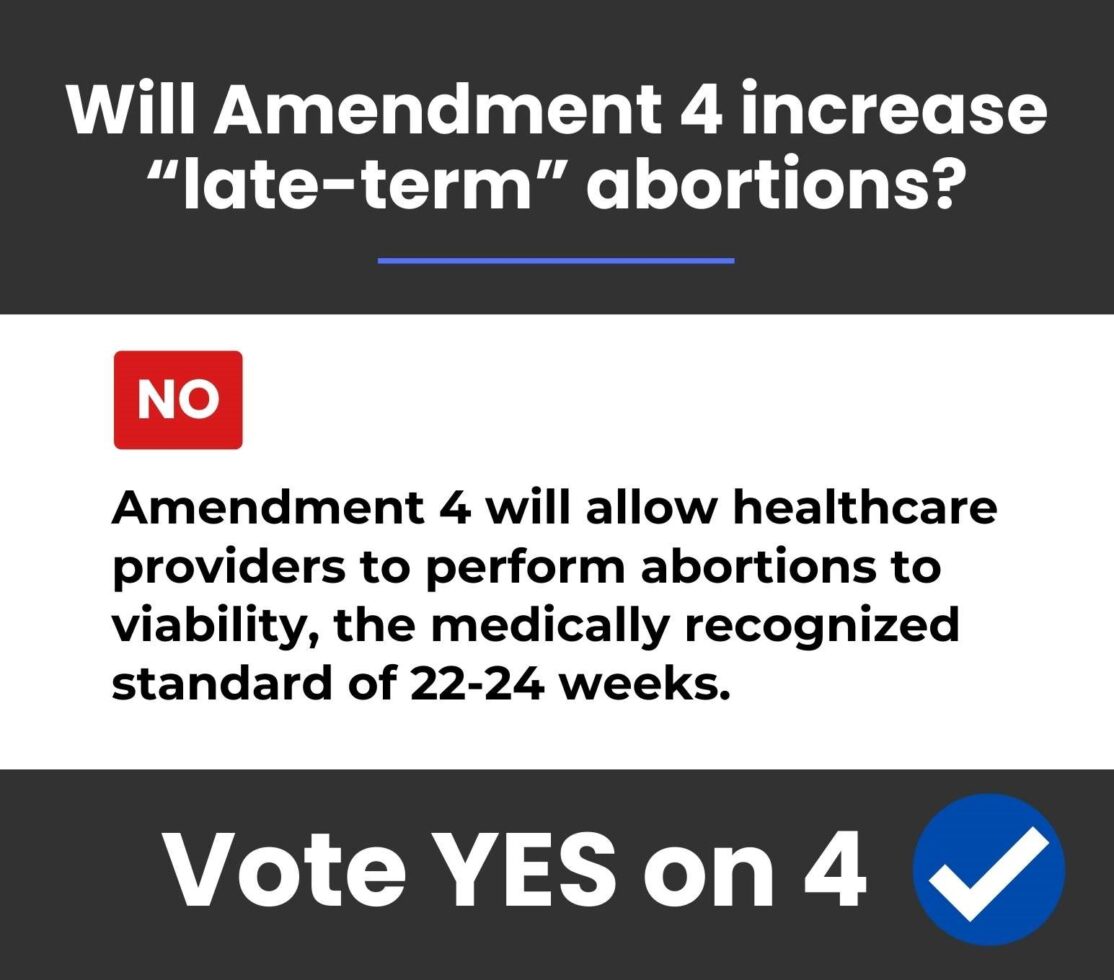
What is a “late-term” abortion?
You may have heard about “late-term,” “partial-birth” or “after-birth” abortions from politicians, but these are not medically recognized terms.
First and foremost, “after-birth” abortions do not exist. Infanticide–or killing a newborn baby–is illegal in all 50 states and U.S. territories. Many politicians have used this fearmongering language as a scare tactic to convince voters that doctors are executing babies in maternity wards with parental consent. Don’t be fooled by their extremist talking points.
Although women have abortions for many reasons at different points of pregnancy, there is no such thing as an abortion after birth.
Some women have abortions that are medically necessary, and some have so-called “elective” abortions, another term that is not recognized or backed by science that has been used by politicians interfering in women’s reproductive lives.
Regardless of why you choose to have an abortion, you should be able to get safe and legal medical care in Florida without fear of being investigated and accused of a crime.
What do Obstetricians and Perinatologists say about “late-term abortion?”
Katrina Kimport, a professor in the Department of Obstetrics, Gynecology & Reproductive Sciences at the University of California’s ANSIRH program, specializes in researching abortion later in pregnancy, which some politicians and anti-choice extremists like to call “late-term abortion,” which is political, not medical, terminology.
“There’s a heartbreaking number of ways that pregnancy can go wrong,” Kimport has pointed out. There are many situations when a clinical diagnosis of severe fetal anomalies happens at a routine anatomy scan, which is typically scheduled when you’re 20 weeks pregnant.
Dr. Kimport has published several studies about abortions later in pregnancy, or that take place in the third trimester. In one study, 28 women of different races ranging in age from 18 to 46 got abortions at different gestational times between 24 and 35 weeks.
One woman in that study who had already experienced complications with a previous pregnancy was told at 20 weeks that everything was going well. But then at 29 weeks, her healthcare providers detected problems with the fetus’ brain.
Initially, they told her not to worry. But further testing showed parts of her unborn baby’s brain were missing, and perinatologists eventually told her there was no possibility her child would survive. The medical diagnosis was that her fetus was incompatible with life.
According to the Centers for Disease Control (CDC), less than 1% of all abortions in the U.S. happen later in pregnancy at or after 21 weeks of gestation, which is considered the second trimester. The vast majority of abortions–nearly 94%–occur at or before 13 weeks of gestation.
For context, if you are pregnant, your team of healthcare providers will run multiple tests and scans to determine the health and viability of your pregnancy. These tests happen throughout the pregnancy in the first, second, and third trimesters. If medical professionals detect a fetal abnormality, you may decide to have an abortion.
If you get a poor prenatal diagnosis, such as trisomy 18 or trisomy 21 (Down syndrome), or if your healthcare provider determines you have an ectopic pregnancy, you may decide to have an abortion. Some of these fetal abnormalities cannot be detected until the second or even third trimester.
Down syndrome is the most common chromosomal abnormality and is more likely to happen when you are 35 or older. If you live in a state where abortion is illegal, like Florida or Alabama, you may not be able to get the care you need.
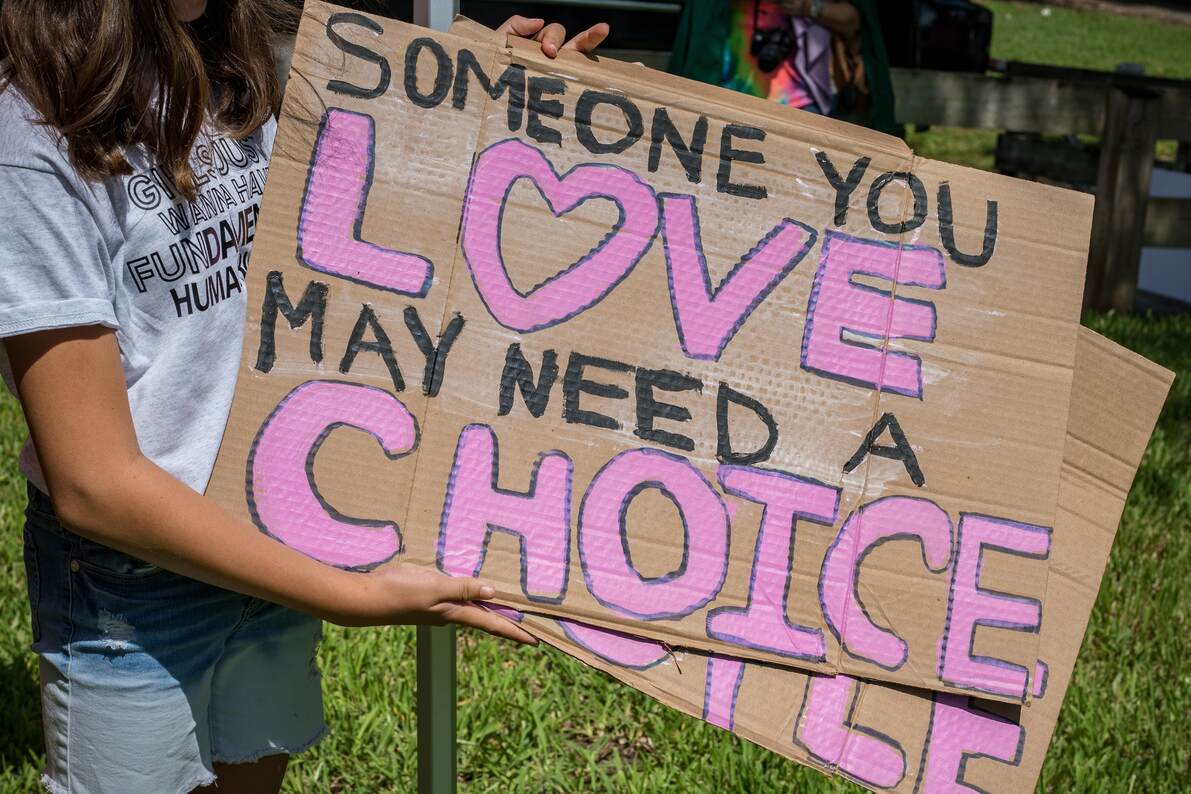
Kelly Shannon was grieving a pregnancy she decided to terminate because of multiple fetal anomalies, including Down syndrome and a heart defect. She got a call that the second committee of Alabama doctors who reviewed her case refused to approve the abortion, despite the exceptions in the state’s law. That meant she would have to leave Alabama to get an abortion.
According to the CDC, infants with Down syndrome and a heart defect are five times more likely to die in their first year of life than those without, but when facing potential criminal prosecution, the Alabama committee of doctors decided to deny Shannon the care she needed.
Stand with someone you love: I am voting YES on Amendment 4 to limit government interference in abortion.
Anya’s Story

Anya Cook Almost Died After Being Denied Care at a Broward County Hospital due to Florida’s Abortion Ban
This is Anya’s story, taken from an interview which you can watch in its entirety below.
My water broke one night when I was walking outside of a restaurant, and I just felt that something was wrong, so I looked at my husband, and I said, “Babe something is wrong. Someone threw water on me,” and he’s like, “No, there’s no one around us and we’re in a dark parking lot.”
Then he said, “Let’s go to the hospital. Let’s go to the emergency room right now.”
We went to the emergency room, and I sat there in the waiting room for an hour with amniotic fluid still dripping onto the floor. That alone was traumatizing. A little boy was there, and he asked his mom “Mommy, what is happening to her?”
Then we had an ultrasound. They sent me back for the ultrasound and my daughter was still moving around and her heart was still beating, but they told me that at that point, because I had lost all my (amniotic) fluid, there’s nothing that I could do.
I looked at the doctor, and I said “Okay, so what are you going to do? What are we supposed to do? Are we terminating?”
“We can’t do anything,” he said.
“Excuse me? You can’t do anything? What does that mean exactly?”
“We can’t do anything, umm, you’re…”
So I said, “Wait, so basically I have to go home and wait it out?”
“Yeah, yeah, wait it out,” he said. “Unfortunately, dear, I’m so sorry.”
You’re sorry? For what? That I’m now going to have to deliver my daughter who will not be alive when she’s born and then… what… where do I put her? How do I transport her back here? What is my husband supposed to do in that situation? How long will this happen from now? Will this happen days or now? I’m not a doctor. I don’t know when this is going to happen.
As I sat there, and I looked at him, and he looked at me, he said “I’m so sorry that’s it.”
“Are you serious?” I said. “That is it? You have nothing else to say to me? You’re not going to help me?”
Then the nurse came, and she was so angry and she just said damn it, and I said “Okay, I’m gonna get out of here because you can’t help me anymore. There’s nothing else that you can do for me.”
He just said “I’m so sorry. I’m so, so sorry.”
I ended up having the baby at a hair salon. I went there because, if I was going to die, my mother wouldn’t have to do my hair. I would make sure that my hair was done for my mother.
That was so sad, and so traumatic. I said goodbye to my mom that morning because I wasn’t sure if I was gonna have my daughter on the way, and I could die.
When I went back home, and I researched P-PROM, I was like, “Oh my God, I’m gonna die. I might get sepsis; I don’t know how fast this is going to happen.”
So I’m in the salon, and then something just told me to go in the bathroom and I went in the bathroom and I sat down, and I just felt something say push, and I heard her hit the water. At that point I had to call my husband because he was outside. I called him, I said “Babe, I need you to come inside,” and he came in.
“What’s wrong,” he said, and I said “I think she’s here but I can’t look.” He said “I won’t let you look I won’t let you look,” and he looked.
“Okay, I see her, but you have blood,” and I remember I started hemorrhaging, and I didn’t realize it because there’s so much adrenaline going through me, and I didn’t know what else to do. He got on the phone, called 9-1-1, and they rushed in.
They grabbed me; they literally had to just grab so much cloth to hold up my blood, and they said “If you can just tense your body up to hold the blood, because if you release your body, you will continue to lose blood.”
“Well can you take me to Coral Springs?”
“You’re not gonna make it to Coral Springs. It’s okay, okay?” he said, and I just I blacked out at that point.
Abortion in Florida
1. What Are the Current Restrictions on Abortion in Florida?
Abortion is legal in Florida only through 6 weeks. The law banning abortion after 6 weeks has legal exceptions for the life of the mother, physical health of the mother, and for lethal fetal abnormalities, as long as they are detected before the 15th week and accompanied by official documentation signed by two practicing Florida doctors.
Legal exceptions for rape, incest, and human trafficking are also included in the law, BUT women, their doctors, and medical organizations agree that these exceptions don’t work in practice. Official documentation is required, which means that if you become pregnant as a result of rape, incest, or human trafficking, you would have to report the crime, collaborate with law enforcement, and get a set of official documents in order to get an abortion in Florida, and you would have to do all of this in a matter of weeks.
Florida law states that “at the time the woman schedules or arrives for her appointment to obtain the abortion, she must provide a copy of a restraining order, police report, medical record, or other court order or documentation providing evidence that she is obtaining the termination of pregnancy because she is a victim of rape, incest, or human trafficking.”
According to the National Sexual Violence Resource Center, only about 25% of rapes and sexual assaults were reported to police in 2018. Many survivors have expressed that they felt revictimized by police when reporting the assault they experienced, which is why so many women are hesitant to report sexual assaults to the police. Some survivors have even had the tables turned on them by police, becoming the focus of the investigation.
Because of these strict requirements, along with reports from patients and medical providers, it is clear that these exceptions do not work in practice. Additionally, most of the critical tests and scans that determine fetal health in utero are conducted at or after 20 weeks of pregnancy, after these exceptions are no longer allowed.
2. Can I Get an Abortion in Florida in One Visit?
Florida has a mandatory 24-hour waiting period, which means that a patient has to make two visits to a clinic, at least 24 hours apart, to get an abortion. The first visit consists of lab work, an ultrasound, state-mandated information, and a meeting with a doctor to discuss the abortion procedure. The abortion cannot occur until the second visit, regardless of the patient’s health.
3. Can a Minor Girl Get an Abortion in Florida Without her Parents’ Consent?
Florida also has parental involvement laws, which means that a parent or legal guardian must be notified and sign an official, notarized document, before the minor can get an abortion. If a minor’s parents are out of the picture–in jail, homeless, mentally incapacitated, deported, in another state or country–or if they are abusive, the minor can go to court and seek a judicial bypass from a judge to approve the abortion.
4. Is Abortion Taxpayer Funded in Florida?
Florida law prohibits the use of taxpayer funding for abortion, including state and federal Medicaid funds, and it goes even further to bar private health plans on the Affordable Care Act (ACA) Marketplace, better known as Obamacare, from paying for abortions. These existing laws will not change.
Abortion Law & Roe
1. What is Roe vs. Wade?
In 1973, Roe v. Wade made abortion legal in all 50 states. Briefly, Medicaid covered abortions regardless of your age or income. Four years later, Congress passed the Hyde Amendment, which cut abortion coverage out of Medicaid unless the woman’s life was endangered. In 1993, the exception was broadened to pay in cases of rape and incest.
Before the Hyde Amendment, the federal government paid for 1/3 of all abortions; since 1977 it has paid for virtually none. Many states use their own money to cover abortion for folks on Medicaid. Florida is not one of them.
Now that the Supreme Court has overturned Roe vs. Wade after more than 50 years as settled law, it has taken away people’s right to control their own reproduction. Anti-choice politicians in Tallahassee and D.C. have also made clear their plan to pass a federal abortion ban, which would outlaw abortion nationwide.
2. How Did Roe Being Overturned Affect Florida?
After the U.S. Supreme Court overturned Roe v. Wade, ending all federal protections for abortion, the Florida Legislature passed a 15-week abortion ban. Then in 2023, they passed a six-week abortion ban.
After 2 years of litigation, the Florida Supreme Court voted to uphold the 15-week ban, thus starting the 30-day countdown for the 6-week ban, which went into effect on May 1, 2024.
The only exceptions to this abortion ban are if you got pregnant as the result of rape, incest, or human trafficking and are cooperating with law enforcement. Most Floridians consider this a dangerous and extreme abortion ban.
Abortion & Healthcare
1. What Does ‘Healthcare Provider’ Mean?
The term “healthcare provider” refers to licensed and qualified medical professionals, ensuring that individuals with appropriate expertise—not non-medical staff—will make decisions about abortion care.
In Florida, only licensed and qualified physicians—specifically medical doctors (M.D.s) and doctors of osteopathic medicine (D.O.s)—are legally authorized to perform abortions and provide abortion care. Nurses, physician assistants, and other healthcare professionals may only assist under physician supervision but cannot independently perform abortions. Amendment 4 does not change these legal requirements.
Amendment 4 reinforces patient safety by ensuring abortion care remains in the hands of qualified, licensed physicians who meet state-mandated medical standards. It does not reduce or eliminate any health or safety regulations. Instead, it protects women and patients by ensuring that politicians cannot interfere in private medical decisions between patients and their doctors.
2. What is Abortion?
Abortion is a medical procedure that ends a pregnancy and is generally performed up until a fetus is viable outside the womb, usually around 23-24 weeks. It is most commonly performed during the first trimester, but can also occur later in pregnancy if health risks arise or there are severe fetal conditions. There are two primary methods: medication abortion, which uses prescribed medication to end a pregnancy, and surgical abortion, a minor procedure performed by a healthcare provider. Abortion is a safe, legal, and commonly practiced medical procedure in the United States, designed to be accessible to those who need it.
3. When Does Abortion Happen?
Abortion typically occurs before the fetus reaches viability, which is generally considered to be around 23-24 weeks of pregnancy. After this point, abortion laws often allow it only under specific, severe circumstances, such as risks to the health or life of the pregnant person or significant fetal health issues. Abortions beyond this timeframe are rare, accounting for less than 1% of all procedures in the United States.
The Importance of Accurate Information
Misinformation about abortion can cause unnecessary fear and misunderstanding. We encourage you to seek accurate, reliable sources like the Guttmacher Institute for detailed and factual information about abortion practices, rights, and laws.
4. What is a Surgical Abortion?
A surgical or procedural abortion is performed in a clinic or hospital by health care providers. If you choose to have a procedural abortion and it has been less than 14 weeks since your last menstruation, your health care provider will perform a vacuum aspiration to end the pregnancy.
Vacuum aspiration is the most common procedural method for abortion early in a pregnancy, and it is extremely safe. According to the University of California’s Advancing New Standards in Reproductive Health (ANSIRH) research program, less than 1% of patients experience a major complication from an abortion.
If you choose to get an abortion and it has been over 14 weeks since your last menstrual cycle, your health care provider will perform a D&E, or dilation and evacuation, which is the most common procedure for abortions at that stage.
Similar to a vacuum aspiration, when you have a D&E, the cervix is dilated and the pregnancy is removed through suction.
5. Are Surgical Abortions Safe for Women and Girls?
Health experts in Florida, across the country, and worldwide agree that surgical abortions performed by health care providers are safe.
According to ANSIRH, the overall complication rate for abortions is lower than those for having a wisdom tooth removed or having your tonsils removed.
In fact, studies have found that you are 14 times more likely to die from childbirth than from having an abortion.
6. What is a Medical Abortion?
Also known as a medication abortion, abortion with pills, or plan C, a medical abortion consists of two safe and effective medications that have been FDA-approved for more than two decades.
According to Florida law, If you choose to have a medication abortion, you must take the first pill at your health care provider’s office. You can then take the following doses of the second pill 24-48 hours later on your own at home.
Although some mistakenly call medication abortions “chemical abortions,” a term that is not recognized by science and has been criticized as fearmongering, the World Health Organization (WHO) has placed these pills on their Essential Medicines List.
7. What is an Emergency Abortion or a Medically Necessary Abortion?
You could need an emergency abortion at any time during a pregnancy. Health care providers will perform an emergency abortion in different circumstances when abortion is the best way to save your life, health, or fertility in a crisis.
If you have an ectopic pregnancy, go into premature labor before the fetus can survive outside of your body, or health care providers detect that the fetus you are carrying is no longer alive or won’t survive outside your womb, they will most likely have to perform an emergency abortion to stabilize your health and prevent future infertility.
Not surprisingly, nearly 70% of OBGYNs across the country reported that since the U.S. Supreme Court overturned Roe, their ability to manage pregnancy-related emergencies has declined.
A large portion of the OBGYNs surveyed by KFF in June 2023 also believe that the Dobbs decision has worsened pregnancy-related mortality (64%), racial and ethnic inequities in maternal health (70%) and the ability to attract new OBGYNs to the field (55%).
8. What is an Ectopic Pregnancy?
An ectopic pregnancy occurs when a fertilized egg grows in a location outside of the uterus. This type of pregnancy is nonviable because your body will not support an ectopic pregnancy. If you have an ectopic pregnancy, health care providers will perform an emergency abortion as lifesaving care. According to the American College of Obstetricians and Gynecologists (ACOG):
Almost all ectopic pregnancies—more than 90%—occur outside of the uterine cavity in a fallopian tube, but they can also implant in the abdomen, cervix, ovary, and cesarean scar. An ectopic pregnancy in any location is life threatening. This is because as the pregnancy grows, it can cause the structure where it is implanted to burst, or rupture. A rupture can cause major internal bleeding and is a life-threatening emergency that requires urgent surgery.
9. What is P-PROM?
Premature rupture of membranes (PROM) is when you leak amniotic fluid before labor begins. It’s commonly called your “water breaking.” If it happens after 37 weeks of pregnancy, your health care provider can deliver your baby.
If it happens earlier, it is commonly called preterm premature rupture of membranes or P-PROM. If your water breaks before 37 weeks of the pregnancy, your health care provider must weigh the risk of premature birth against the risks of complications and risks to your health and future fertility, such as an infection.
When your water breaks very early in the pregnancy, like in the case of Anya Cook in Broward County, health care providers must be able to perform an emergency abortion to prevent sepsis and other complications that could cost you your life, health, or future fertility.
But Cook, who went to a Florida hospital after her water broke in her second trimester at 16 weeks, was discharged from the emergency room because she was not sick enough to qualify for the emergency medical exception in Florida’s abortion law, despite her risk for infection and hemorrhage.
Shanae Smith-Cunningham, who also lives in South Florida, had a similar experience. Smith-Cunningham was turned away from a local emergency room when her water broke at 19 weeks.
Both Cook and Smith-Cunningham had planned, wanted pregnancies and had experienced prior miscarriages. Both almost died from complications after being denied emergency abortions.
10. What is Trisomy 18?
Trisomy 18, also known as Edwards Syndrome, is a genetic disorder in which a fetus has an extra copy of chromosome 18. The causes for trisomy 18 are unknown, but specialists do know that it occurs at the time of conception.
According to Cleveland Clinic, trisomy 18 occurs in one in 5,000 to 6,000 live births, but this genetic disorder is much more common in pregnancy, occurring in one in approximately 2,500 pregnancies.
That’s because at least 95% of fetuses diagnosed with trisomy 18 don’t survive to full term, as these pregnancies end in miscarriage or babies that are stillborn.
There is no cure for trisomy 18. Almost all pregnancies with this diagnosis end in a miscarriage or stillbirth. Of those pregnancies surviving into the third trimester, nearly 40% of babies diagnosed with trisomy 18 don’t survive labor.
The survival rate varies for babies born with trisomy 18:
-Between 60% and 75% survive to their first week.
-Between 20% and 40% survive to their first month.
-Less than 10% survive past their first year.
If you have a child born with trisomy 18, he or she will need specialized care immediately after they are born, and for the rest of their short lives.
About 90%-95% of babies born with trisomy 18 do not survive beyond the first year and many live only a few days. The survival rate is very low, especially if your child has delayed organ development or a congenital heart condition, which are both very common with this diagnosis.
11. How Much Does an Abortion Cost?
An abortion can cost anywhere between hundreds of dollars ($600+) to thousands of dollars, depending on the type of abortion–procedural or medication–and where you are getting care.
This represents the cost of the abortion itself, but you need to also consider other expenses, such as time off work to have the procedure; childcare, if you are already a parent; travel and lodging costs, if you are more than 6 weeks pregnant and need to go outside of Florida to get an abortion.
12. Can I Get Medication Abortion via Telehealth in Florida?
It is illegal to get medication abortion from a health care provider in Florida via telehealth at all stages of pregnancy. Although mife and miso–the abortion pill regimen–have been proven safe and effective, and they have been FDA-approved for over 20 years, Florida law bans all medication abortion via telehealth.
You can get medication abortion via telehealth from different out-of-state providers, including The MAP in Massachusetts. Several states have what is called “shield laws,” which protect medical providers in those states from prosecution from other states when providing abortion pills or gender-affirming care.
Although shield laws protect health care workers in those states, they do not protect anyone in Florida or other states where abortion is illegal. You can consult the Repro Legal Helpline to find out more about your rights and the risks involved with getting medication abortion via telehealth in Florida.
Given the legal risks, it’s best to leave no digital trail when searching for information and care. You can consult the Digital Defense Fund’s Guide to Abortion Privacy to keep your health care decisions private and secure.
You can also check out this handy guide from Reproductive Equity Now, a Boston-based nonprofit organization that serves the New England area and provides accurate information about navigating different abortion services, including physician-supported medication abortion via telehealth.
13. Is Birth Control Still Legal in Florida?
Birth control is legal in all 50 states. Contraception comes in many forms, including condoms, vasectomies, prescription pills, over-the-counter pills, intrauterine devices (IUDs), and emergency contraception (“morning-after pills” or “Plan B”).
14. What is a Self-Managed Abortion (SMA)?
A self-managed abortion is a medication abortion that you take at home or in a place of your own choosing.
According to the World Health Organization (WHO):
In the first 12 weeks of pregnancy, a medical abortion can also be safely self-managed by the pregnant person outside of a health care facility (e.g. at home), in whole or in part. This requires that the woman has access to accurate information, quality medicines and support from a trained health worker (if she needs or wants it during the process).
The WHO explains that “With appropriate support, women can self-manage some or all stages of a medical abortion in the comfort of their own home.”
Based on the WHO’s guidance, you can safely manage a medication abortion at home with mife and miso or with miso alone up to about 12 weeks into a pregnancy.
The Abortion Pill
1. What is the Abortion Pill?
Abortion pills, or medication abortion, are a safe and effective way to end a pregnancy up to 11 weeks gestation, and they’ve been approved by the FDA for over two decades. They are a combination of two medications that help end the pregnancy. If you terminate a pregnancy using medication abortion, you are likely to experience cramping and bleeding in the days following the abortion with pills.
2. How Does the Abortion Pill Work?
Mife, the first medicine which is usually taken in one dose of 200 milligrams, blocks a hormone called progesterone that is needed for the pregnancy to continue. You then take miso within 24 to 48 hours of the mife. The miso expels the fetal tissue from your uterus. You can also take a different dose of miso alone to end a pregnancy.
You can follow up with a health care provider one to two weeks after taking the first dose, or earlier, if you are experiencing unusual symptoms like excessive bleeding or hemorrhaging.
3. Is the Abortion Pill Safe?
Yes. Mife and miso are very safe. The FDA first approved the generic version 25 years ago, and this medication has an extensive record of safety and effectiveness without major complications.
About 6 million women have taken mife since it was first approved by the FDA. There have been only 32 deaths reported to the FDA of women who used the drug to terminate a pregnancy through 2022, however that figure includes all deaths, not just those in which the medication played a role.
Recent reports from ProPublica found that only 11 of those deaths were linked to mife. The majority of those deaths were due to overdoses, suicide, homicide, and ruptured ectopic pregnancies, not the abortion pill.
Additionally, the World Health Organization (WHO), includes both mife and miso in their Essential Medicines List.
According to Dr. Bela Ganatra, head of the Comprehensive Abortion Care Unit at the WHO:
Medical abortion has played a seminal role in expanding access to safe abortion globally, especially for women and girls in the most vulnerable situations who may lack access to health facilities or need to keep their abortion private by avoiding hospital stays, so it’s important that healthcare practitioners can facilitate it as an option for abortion care.
Your Vote Matters
Is the Language in Amendment 4 Confusing or Deceptive?
There’s nothing confusing or deceptive about Amendment 4! You can read the ballot measure language for yourself on the Florida Division of Elections website, or check out Wikipedia’s short explainer:
“Florida Amendment 4 is a proposed amendment to the Florida Constitution that will be subject to a referendum on November 5, 2024. The amendment would preempt the Florida Legislature from restricting abortion beforefetal viability(generally considered to be between 23 and 24 weeks gestational age).”
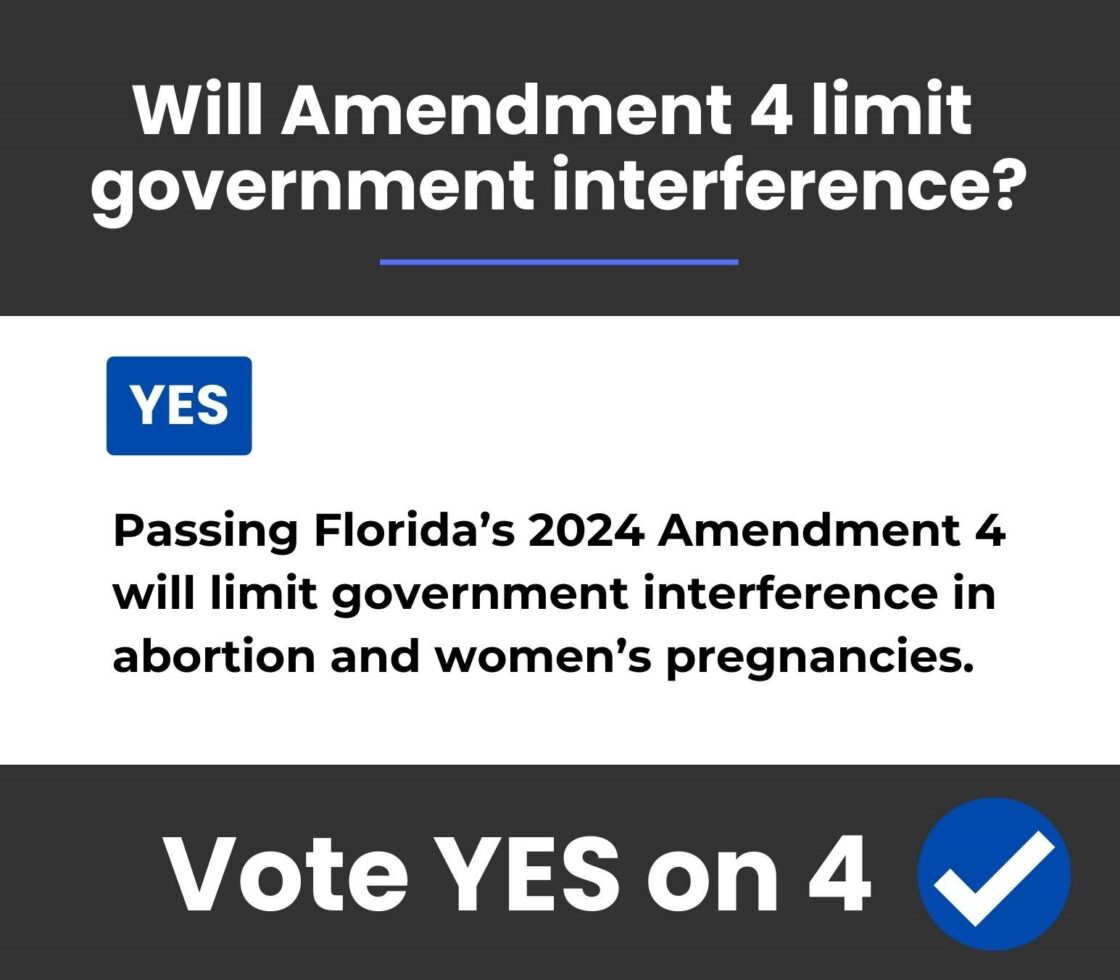
In fact, the Florida Supreme Court, which is made up of mostly conservative justices appointed by former Gov. Rick Scott and Gov. Ron DeSantis, stated in its official ruling to a lawsuit filed by Florida Attorney General Ashley Moody and a host of anti-choice groups:
“That the proposed amendment’s principal goal and chief purpose is to limit government interference with abortion is plainly stated in terms that clearly and unambiguously reflect the text of the proposed amendment. And the broad sweep of this proposed amendment is obvious in the language of the summary. Denying this requires a flight from reality.”
Pregnancy Help Centers
1. What is a Pregnancy Help Center or Crisis Pregnancy Center (CPC)?
With nearly 200 fake women’s health centers in Florida, anti-abortion extremists have a hold on every community. Even though they are sometimes called “Crisis Pregnancy Centers” or CPCs, you cannot get comprehensive reproductive health care at these fake clinics–or much of any health care at all!
They also like to call themselves “Pregnancy Help Clinics” or even “Pregnancy Medical Clinics,” but they’re not medical clinics at all, and they don’t help patients. They use shady tactics to dissuade you from using contraceptives and seeking abortion.
It is important to be aware of these so-called “Pregnancy Help Centers” that present themselves as resources for women and girls facing unplanned pregnancies. These centers will not provide or refer you to get an abortion.
These fake clinics are often deliberately located near actual reproductive health clinics. They create websites that appear in online searches for legitimate abortion clinics and advertise online and in print media in ways that might appeal to those who are considering abortion. These centers also may delay scheduling appointments, thereby preventing you from getting an abortion earlier in pregnancy, sometimes delaying for so long that getting an abortion becomes more difficult, expensive and in some cases, impossible.
So-called “Pregnancy Help Centers” are typically managed and funded by organizations that oppose abortion in any and all circumstances. As a result, if you have an unintended pregnancy and are seeking full options counseling or abortion referrals, they will not help you.
2. How Can You Tell if a Clinic Actually Provides Abortions?
Check the clinic’s website for statements about whether or not it provides abortions. Often, disclosure that the so-called “Pregnancy Help Center” does not provide abortions or referrals is hidden in small print on its website.
You can call the clinic and ask them directly if they offer abortions, what type of abortions they offer (medical with pills or procedural), and see if the clinic seems to hesitate or avoid answering your direct question.

Give for survivor justice taking flight!
While Donald Trump and Pam Bondi want to change the subject, we refuse to let them off the hook for protecting predators. That’s why we're flying airplane banners to keep Trump’s ties to child sex abuser and trafficker Jeffrey Epstein in the news. Epstein’s more than 1,000 survivors deserve transparency and justice. Your gift today will keep the spotlight on Trump’s and Bondi’s deflections and center survivors in the public narrative!